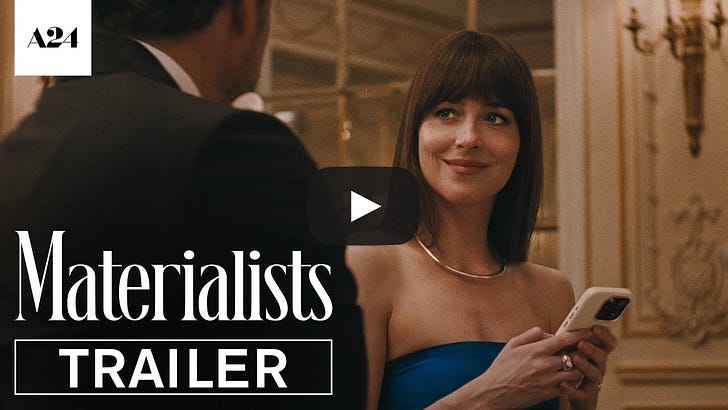→ You can now listen to all Ankler stories in the Substack app. Just hit the “play” arrow at the top right of the screen. When ‘Materialists’ Met ‘H Mart’: How Celine Song & Michelle Zauner Made a Perfect MatchThe Oscar nominee and Japanese Breakfast musician tell me how they made a moving, modern-day love song. Plus: exclusive video of an unplugged performanceI cover where music & Hollywood meet. I wrote about the return of the sexy TV soundtrack with Nobody Wants This, interviewed the brains behind the KPop Demon Hunters songs and spoke to Billy Joel’s right-hand man about the Piano Man’s health. Reach me at rob@theankler.comWhile you read, take a listen to Japanese Breakfast’s “My Baby (Got Nothing At All)” from the Materialists soundtrack:
Earlier this year, I finally read — and loved — Michelle Zauner’s heartfelt 2021 New York Times bestseller, Crying in H Mart. It’s a memoir that serves as a love letter to the food of Zauner’s mother’s Korean culture (her father is white), and also delves into her relationship with — and the devastating loss of — her mom. The book came to me at the right time, as I was dealing with my own grief with the sudden loss of a close cousin. The trick of Zauner’s work is that it finds you when you need it most. That’s because much like her music under the moniker of her acclaimed indie rock band, Japanese Breakfast, she writes from a deeply personal and achingly vulnerable place. Zauner doesn’t flinch when revealing the emotional details of the traumatic eras of her life, from her childhood as one of the few Asian-American kids in Eugene, Ore., to the sometimes complicated relationship with her mother and the emotional rollercoaster of caring for her after she fell ill. That kind of honest appraisal, not to mention her track record of acclaimed music, is what drew filmmaker and Oscar nominee Celine Song (Past Lives) to Zauner when the director was seeking an original song for Materialists. “I feel like I knew about Michelle long before a lot of people knew about her, because of just generally paying attention to the indie music scene,” Song tells me. “I saw that she wrote a book, which I read and loved, and then I just got to watch her star rise over the last decade. When it was time to talk about making an original song for the end credits of my movie, one of the first thoughts I had was, ‘Well, what’s Japanese Breakfast doing? Are they available? What are they up to?’” It turns out Song’s instinct led to a match made in creative heaven — a motif that aptly mimics the movie’s plot, which follows a matchmaker (Dakota Johnson) caught between an old boyfriend (Chris Evans) and a wealthy new suitor (Pedro Pascal). And their camaraderie was on full display earlier this month during a conversation between Song, 37, and Zauner, 36, at New York City’s newly reopened Cherry Lane Theatre, the buzzy venue project from A24, the studio behind Materialists. During the event, Zauner also performed her Materialists track and award hopeful, “My Baby (Got Nothing At All),” and the live rendition can be seen exclusively below. “I’ve made some great string player friends over the years,” Zauner tells me of the performance. “So it turned out to be a stripped-down acoustic set with strings that I think was really beautiful.” Last week, I talked to the two uniquely creative minds, and walked away inspired by their processes, dedication and innate creativity. Exclusive: Watch Michelle Zauner perform My Baby (Got Nothing At All) live at Cherry Lane TheatreRob LeDonne: Celine, why was Japanese Breakfast at the forefront of your thinking for Materialists? Celine Song: I was thinking about what kind of cinema I pursue generally. Somebody told me that cinema is about feelings, and to me, that’s really how I feel about it. I’m really ultimately interested in things that have no material form, and something that is, as a result, quite romantic, you know? So that’s being in pursuit of describing feelings as accurately as I can. I would never want to speak about a musician’s music, but I can only speak to my own feelings about it or my own interpretation of it. And I’ve always felt that Michelle’s work is so grounded in human emotions, and you can see it in her memoir, too. It’s about how we connect as people, and that seemed like it’s aligned with the soul of the movie. There’s always a bit of matchmaking when it comes to who’s right to work on a movie; you’re always looking for the match made in heaven for the particular project or particular moment or particular movie; something where you just have a feeling about it. I just knew that what I’m looking for is something Michelle has at the heart of her work. It’s hard to explain why somebody is a soulmate. That’s kind of what my movie’s about. Michelle Zauner: That’s so sweet! Celine: Well, I mean it.  Michelle, what was it like on the other side, hearing from Celine with the opportunity? Michelle: I was so excited. I mean, it was really a perfect gift to be told that Celine was looking for the song for the end credits for her new movie. We were approached as if we were pitching against other people, but I just really wanted it, and I was such a fan of Celine’s; she’s created such, such beautiful work and is so highly regarded. I think also because it’s the end credits of a film and not just like a sync or something, but writing an original piece for a film. We had a meeting and I just fell in love with her vision and her artistic spirit even more. Michelle, Celine gave you references like John Prine and Natasha Bedingfield to write to. Have you ever written from an overt prompt like that? I know your music is usually so personal. Michelle: Yeah, I mean, it was so fun for me, because I think when I’m writing my own music, it starts from this particular personal place. And when you’re writing for someone else’s project, it has to come from a vast and universal feeling that you then make specific with your own experiences and feelings about it. The only other experience I’ve had is writing for a video game called Sable, which is an open-world game set in an expansive desert with glowworm caves. So that was very different. Celine: I didn’t know that… Michelle: Yeah! So that was fun too, but it was mostly writing for landscapes, like ambient music. The central theme for that was just about coming of age. So I was really excited to get to work on something for a film with such a singular vision and the prompt to write a love song with depth, so this was the first time I got something like this, for sure. But also, those references were at the edges of the box, you know? Telling someone to write something so wide between those two artists; it’s a pretty big box. When we were talking about it, those two were the anchor spots, and anything in between would be amazing. At the end of the day, the most important thing is that it is a love song and there also has to be a part of it where it has to be totally euphoric, like “Unwritten,” while on the other hand being something quite intellectual, like John Prine, with pure open-hearted romance.  It’s a sweet moment when the song kicks in, at the very end, when the characters played by Dakota and Chris are on the bench. Celine, did you always know from writing that an original song would go there, or did it reveal itself to you later? Celine: It’s interesting about movies. Everybody knows how to look at an image, but I think that the thing an audience can miss is the sound of a movie. Film is an audiovisual thing, and I always think about this because the sound is literally invisible and hard to describe. Think about how we get introduced to a film, through a still image. We don’t often get introduced to it by the sound design or a song. But sound is always an integral part of writing (for me). This script had specific needle drops, and I knew exactly where the original song would go. Michelle, aside from the movie’s plot, I heard you drew on your experiences as a fledgling artist in Brooklyn. What was it like writing the lyrics? Michelle: Well, it came at a really charmed time earlier this year when I happened to be preparing for a new album cycle. I had just returned from Korea and received the prompt. It all came together over the span of like one or two weeks, from agreeing to work together, watching the movie, writing the song and recording it at Electric Lady. It felt very meant to be. I realized, while writing, that it was a topic I knew a lot about, because I’ve never once in my life dated anyone who had money. I’ve only ever dated poor people, and my husband, in particular, was the poorest of them all. I got married quite young, and I often think it really worked out because at that age, you really don’t know what you want from your future, and you don’t have any ideas about meeting someone who has a good job or a certain salary. I didn’t mind that my husband lived with five roommates and his bedroom had no windows, and he didn’t have a bed frame. Those are things that, now in my 30s, would be red flags for me. But at the time, you know, it was just all kind of par for the course. So it was really fun to go back to that time and remember falling in love with someone when you can’t help how you feel. I actually re-watched Materialists yesterday, and I find it funny that I’ve enjoyed Celine’s movies so much more on the second watch. With Past Lives in particular, I couldn’t relate to it at first, but then I watched it again after I moved to Korea. I was in a period of my life when I could understand that film so much more deeply, like maybe I wasn’t ready for it when I first watched it. With Materialists, no matter how lovely someone’s apartment is, how nice their clothes are, their belongings, you can’t purchase a feeling of trust. Celine, what was your first time like listening to “(My Baby) Got Nothing At All”? Celine: I said, well, that’s gonna be in the movie. I didn’t have any notes or anything. What’s amazing about getting to be a film director is that you get to work with musicians who have complete and total control of their own work. I always feel so crazy giving notes to my composers or somebody who made a song for the movie. But you have to do it sometimes. When it came to “My Baby,” it landed in my inbox. I listened to it once and was like, ‘Oh, it’s gonna be in the movie exactly as is.’ I was like, ‘It’s perfect!’ It kicks in right after Chris has the kicker that sums up the entire point of the movie. Celine: He says, “How would you like to make a very bad financial decision?” And then it’s almost like Dakota Johnson’s character is singing the lyrics back to him. Celine: The song reflects the whole film. It has to feel like Lucy (Johnson’s character) is singing it, and also Chris Evans’ character, John, singing it as well. I’ve seen people say the film is a throwback; meanwhile, the song feels very ’90s. Was that a coincidence? Michelle: I think that might’ve been an accident. My references for the song were Motown era pop music, these great songs by The Ronettes, The Supremes or The Four Tops, they all sing lyrics like “Be My Baby” and “Baby Love.” That was also an inspiration for the drum and tambourine sound with these analog instruments. It’s all acoustic electric guitar, strings, bass and drums, and no synths or programming. Maybe even Melissa Etheridge? Michelle: Maybe it’s the open D acoustic guitar and a girl singing about love. That music is really in my DNA, and so I wouldn’t be surprised if, subconsciously, it comes out in some of the music I make. Celine: If you ask me what kind of movies the movie is referenced to, I would say they’re movies from Billy Wilder and Jim Brooks, as well as Nora Ephron, who is probably the most recent. I always wanted it to be a very, very serious romantic film set in 2025. What Michelle’s work naturally has is a feeling of something a little bit timeless. The only thing that’s true about love in general is that it’s always been here, and love songs have always been here. I assume the first songs ever were about love. So I thought it all had to be as timeless as love itself. Image credits: Song: Hoda Davaine/Getty Images; Zauner: Rebecca Sapp/Getty Images for The Recording Academy; Materialists: A24Got a tip or story pitch? Email tips@theankler.com ICYMI from The AnklerThe Wakeup Netflix starts WB deal recon, Charter’s big #cordcutting reversal Does Horror Pass the Four Tests of Profitability? I’ll Tell You Entertainment Strategy Guy breaks down the data that reveals why the industry’s favorite ‘cheap win’ often doesn’t Hollywood’s Advancement in the Art of the Layoff Memo Richard Rushfield on the industry ‘right-sizing’ its way into the ‘future’; thanks, John Malone! Warner Bros. Insiders: Quiet Panic as Muscle Memory Kicks In — With One Big Asterisk It’s déjà vu, writes Lesley Goldberg, only now, studio veterans can see which jobs survive before the next axe even swings. Scariest Thing in Hollywood Right Now? Missing the Brand Money in Horror Ashley Cullins talks to pros from Blumhouse and elsewhere about how advertisers are finding the genre’s loyal young fans Female Directors and Hollywood’s Grim Post-#MeToo Reality We’re in our own manosphere and it’s time to get mad, Richard writes Sports Doc Fatigue: Hollywood’s New Endurance Test (and How to Cure It) Producers, agents & execs tell Elaine Low how they’re rewriting the playbook to keep audiences in the game. Plus, more from her Unscripted Sellers’ Series:
Oscar Puzzle Part II: The Acting Categories That Have Pundits On Edge Plus: What to read into the Gotham Awards noms The Frankenstein Surge, and How Its Crafts Can Lead to an Oscars Future Guillermo del Toro’s movie may follow a path paved by Dune and Mad Max: Fury Road, writes Katey Rich 🎬 Rushfield Lunch: Kristen Stewart on the ‘Crock of Sh—’ Fed Female Directors The actress makes an excellent feature directorial debut with The Chronology of Water and sounds off on fake ‘brownie points’ & more 🎬 Richard & Sean: Where Springsteen: Deliver Me From Nowhere Went Wrong The Bruce biopic stumbles as ‘an indie masquerading as a studio movie’ 🎧 Hollywood’s Recession Alarm Just Went Off Layoffs, layoffs and more layoffs put the industry on high alert. What will it mean for 2026? 🎧 The Pulitzer-Winning Playwright Plucked by Kathryn Bigelow Tracy Letts has become one of the industry’s most in-demand character actors: ‘I pretend with authority’ More from Ankler MediaNew from Natalie Jarvey’s creator economy newsletter: I Go Inside CNN Creators. But Can It Compete With Newsfluencers Already Winning? Golden Globes Podcast Award Mess Mounts as Top Stars Mull Skipping Race Andy Lewis’ latest IP picks: |







